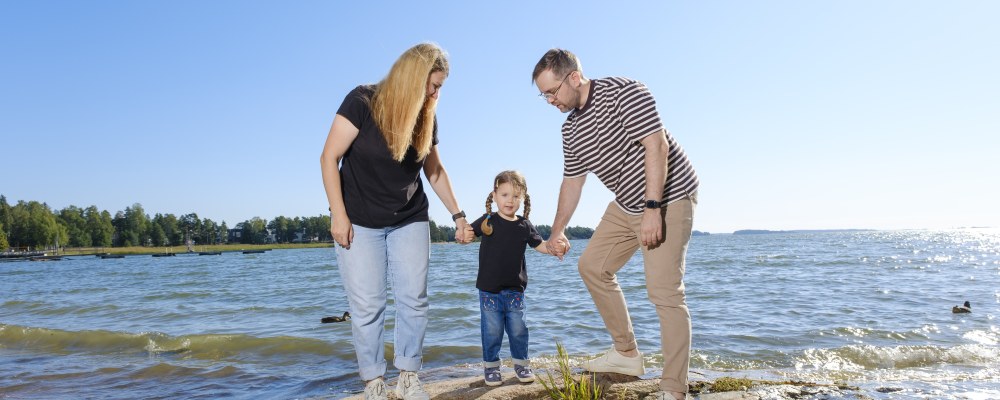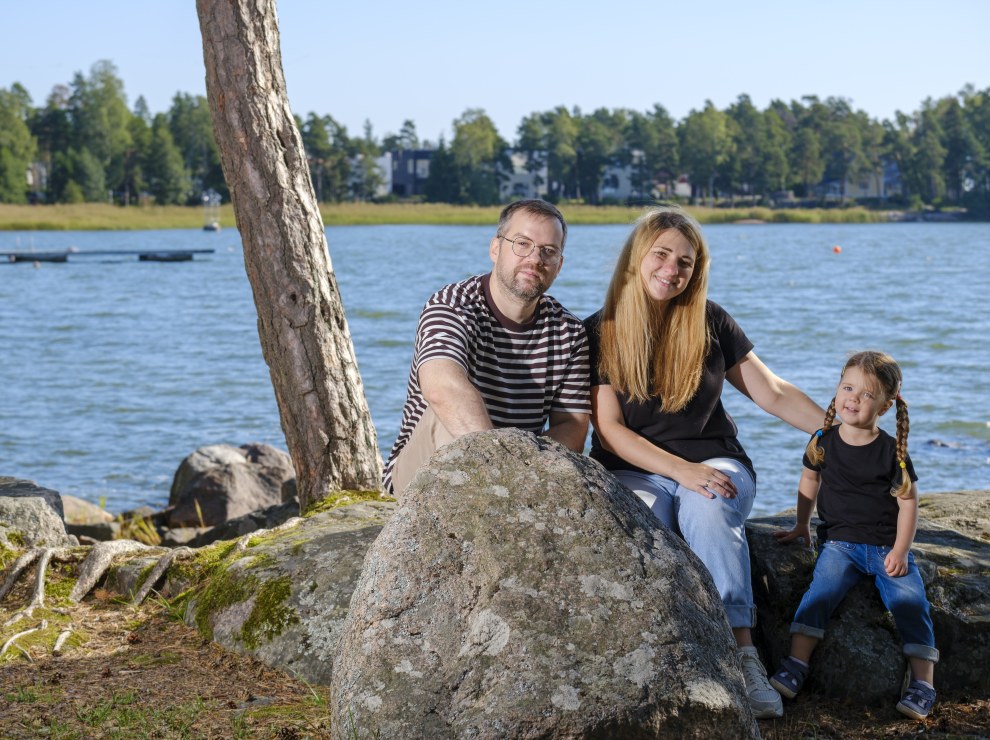
In summer 2021, Project Manager Sergii Kononenko received an offer from his employer, the wind turbine manufacturer Nordex Group, to move from Ukraine to Finland.
“We agreed that I’d start in April 2022.”
When Russia attacked Ukraine in February 2022, Sergii was on a business trip in Poland. His spouse Valentyna, who was on maternity leave, grabbed their documents and 18-month-old daughter and rushed from Kyiv to Poland.
“My soon-to-be boss met us in Helsinki and was a big help. My employer arranged hotel accommodation for us through March and advised us what all the authorities would require from us. A couple days later I had a Kela card and a tax number.”
Sergii had taken care of most of the documents right after he signed his contract, and the family had residence permits that would be valid from April.
“Banking credentials were essential. You need them to log in to all the online services, and you also need a bank account to rent an apartment. But it's difficult to open an account before you have a valid residence permit. Luckily, my bank was able to arrange this.”
Getting the rotors turning
The Kononenkos both graduated as masters of technical science from the Donetsk National Technical University, Valentyna in 2009 with environmental protection as her major, Sergii in electromechanics in 2011.
Sergii has worked as a service manager at DTEK Group in the energy industry, as project engineer for Bayer Crop Science and, since April 2019, as project manager for Nordex Group. The headquarters of Nordex are located in Germany and the group has a workforce of more than 9 000 staff worldwide. Last year, the group generated revenues of EUR 5.7 billion.
“My area now consists of Norway, Sweden and Finland. I’m responsible for wind farm construction projects, and I serve as the contact person for customers in the implementation of agreements, which typically includes turbine delivery, installation and commissioning. We currently have a couple of projects near Kalajoki and in Närpiö.”
Sergii is part of a project manager team of about 30 professionals and works in cooperation with maintenance, quality, production and logistics.
It feels exciting to see the final outcome.
“At first, there’s nothing on the field. Within six months to a year, there’s a complete wind farm that produces energy.”
Finns do not chop and change
“I like the Finnish way of getting things done in five minutes,” says Sergii.
“For example, when I asked someone to confirm a few sentences for me, I received an OK in no time. Finns are straightforward, they don't chop and change, and they don't make you do any unnecessary work. That’s a good thing in business – you can focus on moving forward.”
That being said, July was an exotic experience.
“It’s hard to run projects when you can't expect anyone to be at work. Or at least things don’t move very fast.”
“In Finland, people really give a lot of thought to the balance between work and leisure. In Ukraine, it's normal to be assigned tasks with a deadline that was yesterday. Finns are more laid-back: if you need a rest, everyone respects that and nobody starts telling you what to do. And if you work extra hours, you’re entitled to take corresponding time off.”
Trade unions have a smaller role in Ukraine.
“It's very different here: trade unions affect working conditions and companies in a positive way, and I’ve understood that the government supports employees’ rights, which is great. The same goes for statutory occupational health care.”
Sergii has also seen strikes in Finland.
“They were new to me; I was almost worried.”
Finland should flag its good sides
If we want to attract international talents to Finland, we should say so.
“We all know about the nursing shortage and these jobs are advertised to foreigners everywhere, but I don’t recall seeing any campaigns for academic engineers. You should make it clear that they are more than welcome here and describe the jobs that are available, how many and where they are – what they can expect,” says Sergii.
Finland´s numerous good sides are worth flagging.
“It’s easy to get the paperwork sorted out online; simply follow the clearly written instructions on the websites of the Finnish Immigration Service, the Police and Kela. You can get by in English even in smaller cities. You should still keep in mind that learning to speak Finnish fluently is important and will take time.”
For anyone considering moving to Finland, Sergii would suggest that they study the pros and cons of the country from their perspective so that reality does not turn out to be different from what they expect.
“Learn about the labour market, day care, the education system, neighbourhoods – Finland may be right for you or not. Know what your ‘go-for-it’ thing is.”
Future for the Kononenkos remains open.
“We’re looking for stability and we’d be very happy to settle here; at least we plan to stay here for a long time. We’ll see, everything can change. The most important thing right now is for Valentyna to find a job. Both of us having jobs is not just a financial issue for us, but part of a good life.”

Getting a grip on Finland
Valentyna Kononenko registered at the TE Office and completed an integration training programme for immigrants with an academic degree. The one-year programme consisted of Finnish language and communication, working life and citizenship skills, three-week language training and a six-week on-the-job training course.
“I’m grateful to Finland for this opportunity. In addition to the language, I was able to learn more about the Finnish society and working life, such as employment contracts and taxation.”
Valentyna has built her career in managerial and specialist positions in environmental protection, working for chemical, mining and steel companies and in regional administration. In her most recent role as an environmental inspector for Coca-Cola, she calculated carbon footprints, managed environmental sustainability reporting projects and developed environmental protection guidelines that comply with international standards.
In spring, she had to find an on-the-job training position in Finland.
“I sent numerous e-mails. I received rejections, sometimes my applications received no response at all. Then I thought about asking for advice on LinkedIn and ended up getting numerous tips – and an on-the-job training place.”
One Click LCA develops software for life cycle assessment mainly for the building sector and for Environmental Product Declarations (EPDs). Valentyna joined the data team to practice calculating material life cycle assessments and to generate EPDs.
“All my colleagues helped me out; I felt like part of the team.”
She believes that the Finnish working culture has a different kind of leadership style, one that is open and inclusive.
“Companies have clear goals and every employee understands them and knows what to do to achieve them.”